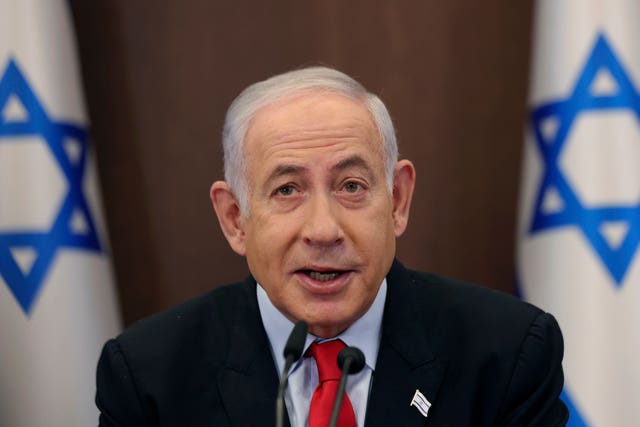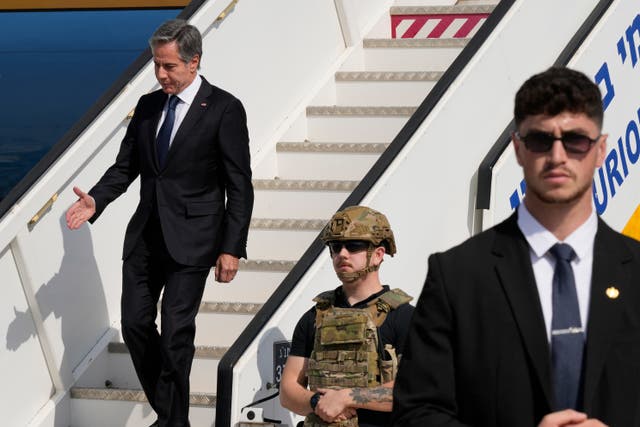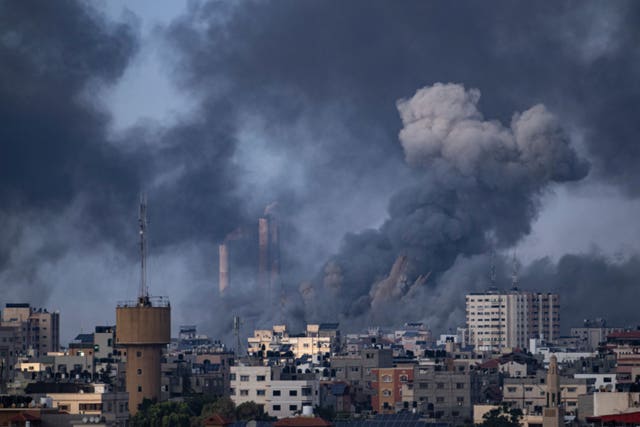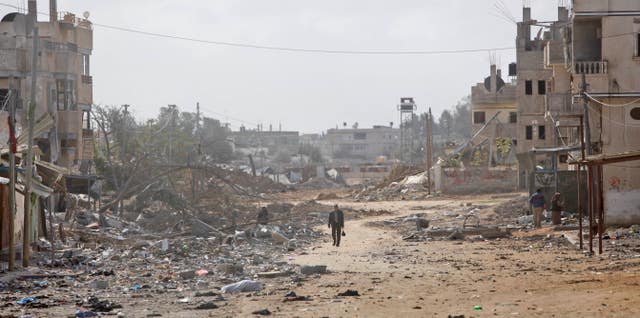
Shelagh Fogarty 1pm - 4pm
12 October 2023, 20:34

Israeli military spokesman Lt Col Richard Hecht said the political leadership has not yet ordered an invasion of Gaza.
Palestinians in Gaza lined up outside bakeries on Thursday after spending the night in pitch darkness surrounded by the ruins of destroyed neighbourhoods, as Israel launched new air strikes and said it was preparing for a possible ground invasion.
International aid groups warned that deaths in Gaza could accelerate as Israel prevents the delivery of supplies.
The warning came as Gaza’s interior ministry said an Israeli airstrike on a residential building in the densely populated Jabaliya refugee camp in northern Gaza had killed at least 45 people and wounded dozens more.
Spokesman Eyad Bozum told The Associated Press that a late afternoon airstrike hit the al-Shihab family house at the centre of the Jabaliya camp.
The house was packed with dozens of relatives at the time of the airstrike. Some had fled heavy bombing from other parts of the strip and taken refuge there.
The war, which was ignited by a bloody and wide-ranging Hamas attack into Israel, has already claimed at least 2,600 lives on both sides.
Lt Col Richard Hecht, an Israeli military spokesman, told reporters on Thursday that forces “are preparing for a ground manoeuvre if decided”, but that the political leadership has not yet ordered one.
A ground offensive in Gaza, the first since the 2014 war, would likely bring even higher casualties on both sides in brutal house-to-house fighting.
A high-ranking Hamas official, Saleh Al-Arouri, warned on Thursday that any Israeli invasion of Gaza “will turn into a disaster for its army”, saying the group was prepared to respond.
In Gaza, Palestinians fleeing air strikes could be seen running through the streets, carrying their belongings and looking for a safe place. Hundreds of thousands have crowded into UN-run schools while others are staying with relatives or even strangers who let them in.
Lines formed outside bakeries and grocery stores during the few hours they dare to open, and the bakeries could soon shut down for lack of fuel or power.

Israeli Prime Minister Benjamin Netanyahu vowed to “crush and destroy” Hamas with the support of a new war cabinet formed on Wednesday that includes a long-time opposition critic.
“Every Hamas member is a dead man,” Mr Netanyahu said in a televised address.
The US has pledged unwavering support for Israel’s response, and secretary of state Antony Blinken arrived in Tel Aviv on Thursday to meet Mr Netanyahu and other Israeli leaders.
“You may be strong enough on your own to defend yourselves, but as long as America exists you will never have to,” Mr Blinken said after meeting Mr Netanyahu. “We will always be there by your side.”
The Israeli military said overnight strikes targeted Hamas’s elite Nukhba forces, including command centres used by the fighters who attacked Israel on Saturday, and the home of a senior Hamas naval operative that it said was used to store unspecified weapons.
“Right now we are focused on taking out their senior leadership,” Lt Col Hecht said. “Not only the military leadership, but also the governmental leadership, all the way up to (top Hamas leader Yehiyeh) Sinwar. They were directly connected.”
The Hamas-run Interior Ministry said Israeli strikes demolished two multi-storey houses on top of residents without warning, killing and wounding “a large number” of people, mainly civilians. Hamas has threatened to kill Israeli hostages if Israel strikes Palestinian civilians without warning.
Israel has halted the entry of food, water, fuel and medicine into the territory. On Tuesday, Gaza’s only power station ran out of fuel and shut down, leaving only lights powered by scattered private generators. Those will shut off as well if fuel is not allowed in.
A senior official with the International Committee of the Red Cross (ICRC) warned that lack of electricity could cripple hospitals, as he called for Hamas to release hostages.
“As Gaza loses power, hospitals lose power, putting newborns in incubators and elderly patients on oxygen at risk. Kidney dialysis stops, and X-rays can’t be taken,” said Fabrizio Carboni, the ICRC’s regional director. “Without electricity, hospitals risk turning into morgues.”
Israel’s energy minister, Israel Katz, said nothing would be allowed into Gaza until the captives were released.
“Not a single electricity switch will be flipped on, not a single faucet will be turned on, and not a single fuel truck will enter until the Israeli hostages are returned home,” he said on social media.

In Israel, opposition leader Benny Gantz, a former defence minister and political opponent of Mr Netanyahu, joined a new wartime cabinet at a time when the Israeli military appears increasingly likely to launch a ground offensive into Gaza.
Israel has mobilised 360,000 reservists, massed additional forces near Gaza and evacuated tens of thousands of residents from nearby communities.
The Israeli government is under intense public pressure to topple Hamas after its militants stormed through a border fence on Saturday and massacred hundreds of Israelis in their homes, on the streets and at an outdoor music festival.
Mr Netanyahu alleged that the attackers engaged in atrocities, including binding boys and girls and shooting them in the head, burning people alive, raping women and beheading soldiers.
The prime minister’s allegations could not be independently confirmed, and authorities did not immediately offer further details. Rescue workers and witnesses have described horrifying scenes, including the slaughter of elderly people and finding bloody rooms crowded with massacred civilians.
Militants in Gaza are holding an estimated 150 people taken hostage from Israel — soldiers, men, women, children and older adults — and they have fired thousands of rockets into Israel over the past five days.

Israel’s increasingly destructive air strikes in Gaza have flattened entire city blocks and left unknown numbers of bodies beneath debris.
A ground offensive in Gaza, whose 2.3 million residents are densely packed into a strip of land only 25 miles long, would likely result in a surge of casualties on both sides.
The UN said late Wednesday the number of people displaced by the air strikes had soared 30% within 24 hours, to 339,000, two thirds of them crowding into UN schools. Others sought shelter in the shrinking number of safe neighbourhoods.
The Egyptian government rejected an American proposal to allow Palestinians fleeing Israel’s bombardment to leave Gaza, a senior Egyptian official said Thursday.
Egypt believes that Palestinians leaving Gaza would harm the Palestinian cause, and its state-run media reported that the Israeli offensive is part of a scheme to empty the enclave.
Convoys stood loaded with fuel and food on Wednesday on the Egyptian side of the Rafah crossing, but were unable to enter Gaza, the official said. The only crossing point between Egypt and Gaza was shut down on Tuesday following nearby Israeli air strikes.

The official said Egypt was talking with Israel and the US on establishing safe corridors inside Gaza and delivering humanitarian aid to the besieged Palestinians, and with Israel and other foreign governments to evacuate foreigners through the Rafah crossing point.
The risk of the war spreading was evident on Wednesday after the Iranian-backed Lebanese militant group Hezbollah fired anti-tank missiles at an Israeli military position and claimed to have killed and wounded troops.
The Israeli military confirmed the attack but did not comment on possible casualties. The Israeli army shelled the area in southern Lebanon where the attack was launched.
The death toll in Gaza rose to 1,417 on Thursday, according to local authorities.
The Gaza Strip’s biggest hospital, Al-Shifa, has only enough fuel to keep power on for three days, said Matthias Kannes, a Gaza-based official for Doctors Without Borders. The group said the two hospitals it runs in Gaza were running out of surgical equipment, antibiotics, fuel and other supplies.
Meanwhile, the Israeli military said more than 1,300 people, including 247 soldiers, have been killed in Israel, a staggering toll unseen since the 1973 war with Egypt and Syria that lasted weeks.
Israel says roughly 1,500 Hamas militants were killed inside Israel, and that hundreds of the dead inside Gaza are Hamas members.